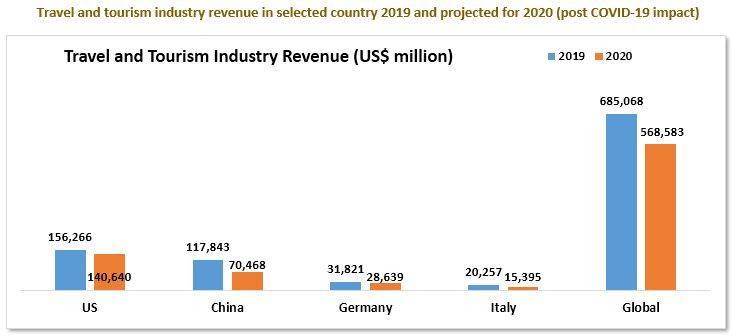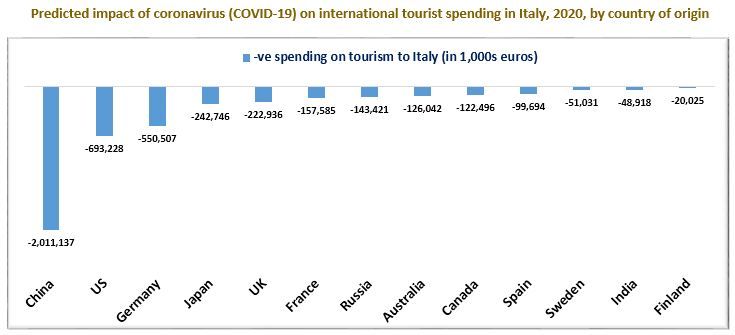
Impact Of Covid-19 Countermeasures On European Tourism Industry
After China and the United States, Europe is most affected by the COVID-19 pandemic. Italy is the worst affected country in the European Union followed by Spain and Germany. As of 25th March Italy recorded more than 74 thousand positive cases of COVID-19. The country has also witnessed 7,503 deaths due to the disease, most by any country globally. Spain has witnessed the second-highest number of deaths of 3,647 individuals of COVID-19 disease. Europe is one of the most preferred tourist destinations around the globe. Europe’s tourism industry is bracing itself for an economic impact that might potentially throw several European nations into recession, owing to the ongoing devastation of the COVID-19 crisis on the continent especially in countries such as Italy, Spain, and Germany among others. Due to the travel and visa restrictions, the number of visitors/tourists visiting Europe is expected to decline drastically. As per the European Commissioner for the internal market, without a steady stream of visitors to Europe from other parts of the world, the European tourism industry is expected to lose more than 1 million Euros per month. Concerned with the looming impact of the disease on the tourism sector in Europe, the European tourism alliance and European travel and tourism sector issued a statement, calling for adequate measures to limit the impact of COVID-19 in the region. With millions of jobs currently at stake, several SMEs are in the situation of closing their business. Looking at this crisis, the European Commission promised structural funds amounting to 37 billion Euros to support the health system, SMEs and affected sector and workers. The Commission is also looking for a 28 billion Euro of structural fund available for the affected sector in the region.
Country-wise impact analysis of COVID-19 in Europe (Most affected Country)
Italy (Worst-hit European nation)
Europe’s worst-hit country by the COVID-19 outbreak, Italy (As of 25th March, Italy recorded more than 74 thousand positive cases of COVID-19 and witnessed 7,503 deaths due to the disease, most by any country globally) is expected to witness an economic fall due to lack of revenue from the tourism sector, mostly during the time of Easter, as Rome’s piazzas are expected to remain empty during the Easter period of the year. Easter which draws more than 10 thousand visitors to site in Rome and the Vatican City every year, is expected to witness less of no visitors this year owing to the COVID-19, which has forced the country to lockdown and no one is allowed to leave their home. Italy is expected to lose approximately 4.5 billion Euros from the tourism sector in the year 2020 as COVID-19 virus fears to keep visitors away from Italy. To add on, if the situation continues for long period and virus continues to keep the visitors away, Italy would lose approximately 7.4 billion Euros between March and end of May alone, as per the estimates of tourism lobby of the country

Spain (second most affected European country)
Spain has witnessed the second highest number of deaths of 3,647 individuals of COVID-19 disease. In Spain, the COVID-19 virus would have a direct impact on the country’s tourism sector along with the other sector. At the beginning of March, and as the situation continued to become more dangerous in Spain, a clear negative effect is expected to be seen in confidence from visitors and potential visitors. In the recent study, flight searches between the 1st January and the 9th March 2020 to travel to Spain’s top 15 national airports have witnessed a downfall in March 2020. Prices to fly to Spain for Easter are decreasing between 10% and 22% if we compare prices on offer by airlines in January vs prices in February. When comparing average prices of hotels during Easter 2020 to average prices of hotels during Easter 2019, a clear drop in prices for all hotel categories can be seen, in particular for 4 and 5-star categories, where the drop is close to 12%
Greece & Portugal
Greece which has been emerging from the decade long financial crisis, is expected to witness low revenue generation from the tourism sector owing to the COVID-19 amid. As per the London based World Travel and Tourism Council, the tourism sector accounts for 20% of the Greek economy and 25% of the jobs in the country. Hotel Sector in the county generated revenue of 8.7 billion euros in the year 2019, representing an increase of 7% compared to that of 2018. However, the sector is expected to lose a huge amount of revenue owing to the lack of visitors visiting the country during the COVID-19 outbreak. Portugal’s tourism sector is already feeling the impact of COVID-19 breakdown. The country has witnessed 60% of hotels in the southern Algarve region reporting cancellation and employees across the nation are fearing that the worst is yet to come. Portugal attracted more than 16.3 million foreign visitors in 2019, up from almost 10 million in 2010. The sector contributes 14.6% to the GDP in 2018
Conclusion
Within Europe, the spread of the coronavirus has tested a core belief in fluid cross-border travel and trade. It has also drawn a line under the European Union’s lack of control over an area where most authority resides with national governments. Spain and Portugal partially sealed their borders, while Austria prevented people from crossing into the country from Italy – the hardest-hit EU member state in terms of confirmed COVID-19 cases – without a health certificate (Austria also reintroduced border controls with Switzerland). Germany, too, sealed borders (with the exception of goods and commuters), and the Czech Republic followed an initial restriction on entry to the country from 15 countries including fellow EU members with a broader ban on all inbound foreign travel.
